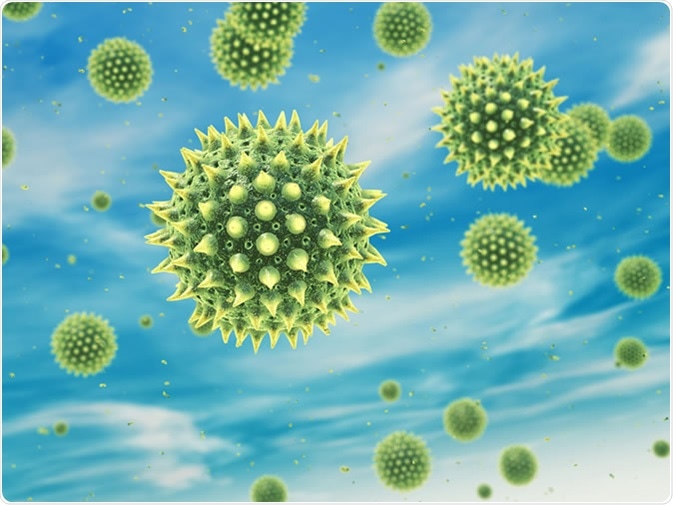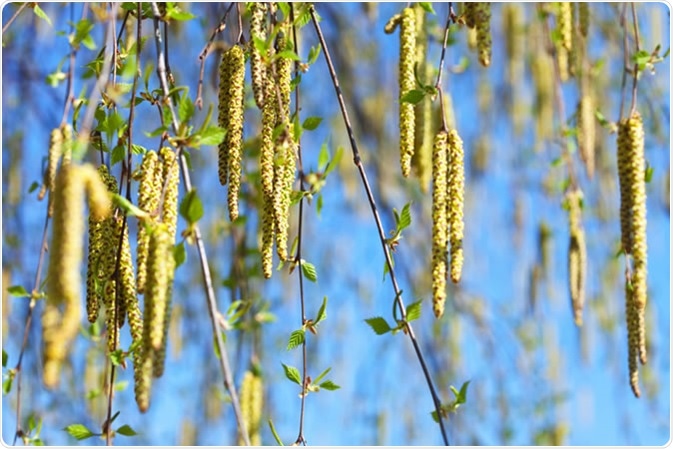Skip to:
Pollen grains are released by trees, flowers and other plans with to fertilize other plants of the same species. An allergy to pollen is one of the most allergic reactions is the USA.
Studies show that the pollen map of the world is changing due to climate change, international travel and the higher frequency of extreme weather conditions such as thunderstorms. These factors cause an increase of the transport of allergenic pollen, making it more challenging than ever for people suffering from pollen allergies. Understanding these allergy symptoms and what causes them is the first step towards treating pollen allergies and making day-to-day life a lot easier and more pleasant.

Airborne pollen grains. Image Credit: Nobeastsofierce / Shutterstock
How allergies usually work?
Our bodies naturally defend us against dangerous invaders by the activation of our immune system. Allergies are mediated by a protein called Immunoglobulin-E (IgE). IgE is an antibody that our immune system produces in response to a danger in order to fight a potentially harmful substance. People who have allergies can produce more IgE than other people in response to harmless substance such as pollen and consequently produce an allergic reaction.
The most common symptoms of an allergic reaction to pollen include watery eyes, runny nose and sneezing. The symptoms can occur all-year-around or only during certain times of the year when specific pollen types are released. For example, people allergic to ragweed are sensitive only during late spring and early autumn.
Types of Pollen Allergies
The most common allergens include the following:
- Birch pollen: These are the tiny particles released by trees during spring and are easily scattered around by the wind.
- Oak Pollen: Much the same way as birch trees, oak trees release pollen in the air during spring time. Though not as allergenic as other pollen, oak pollen stay in the air for a longer period of time so more people are exposed to it. It can cause severe allergic reactions in some cases.
- Grass Pollen: This is the primary pollen allergen during the summer. It can trigger the most severe allergic reactions with rather difficult symptoms to treat. The most reliable way to relieve symptoms of grass pollen allergic reaction is by taking allergy tablets and allergy shots.
- Ragweed Pollen: This type of pollen is released by the ragweed plant and is most active during late spring and early autumn.

Birch pollen: These are the tiny particles released by trees during spring and are easily scattered around by the wind. Image Credit: Iakov Filimonov / Shutterstock
Diagnosis of Pollen Allergies
Most general practitioners (GPs) can easily recognise pollen allergies though you might be referred to an allergist for further testing in order to confirm the diagnosis.
The GP carries out the assessment by first asking about your medical history and the symptoms that you have experienced. Following that, a skin prick test is performed to discover the specific pollen that is causing the allergic reaction. This is done by pricking the skin and inserting very small amounts of potential allergens. If you are allergic to any of these substances, an allergic reaction in the form of redness, itchiness and swelling develops within 15 to 20 minutes upon the insertion of the allergen.
An alternative to the skin pricking test is the Specific IgE Blood test. After taking a blood sample, the doctor sends this to a laboratory where allergens are added to the blood sample. If the cells in the blood sample produce antibodies to the allergens tested these are measured.
How to Treat Pollen Allergies?
Pollen is one of the most difficult allergens to avoid. It is possible to minimize the exposure to pollen by avoiding going out on windy days during high pollen periods of the year, wearing a mask and avoiding any gardening work.
There are some medications that can help to alleviate your symptoms such as antihistamines and decongestants. Some people take allergy shots when these medications are not relieving the symptoms. Allergy shots resemble immunotherapy where allergens are injected on multiple occasions. These shots desensitize the immune system to the allergen by gradual exposure and thus minimizing the severity of the allergic reaction.
There are also a number of actions that can help to fight pollen allergy. These include removing any clothes that you have worn outdoors, using air-conditioners at home and in your car to avoid opening windows, drying your clothes in a tumble dryer not outside, vacuuming with a vacuum cleaning that has a HEPA filter.
If any of the medications that you are taking are causing side effects or you allergy is getting worse you should get in touch with your GP. Also, always consult a doctor before trying out a new medication or any alternative medicine to treat an allergy. Even though pollen allergies can cause a lot of inconvenience in your daily life, making some small changes in your lifestyle and taking appropriate medication can help to reduce the severity of your allergy symptoms.
References
Further Reading
Last Updated: Oct 17, 2019